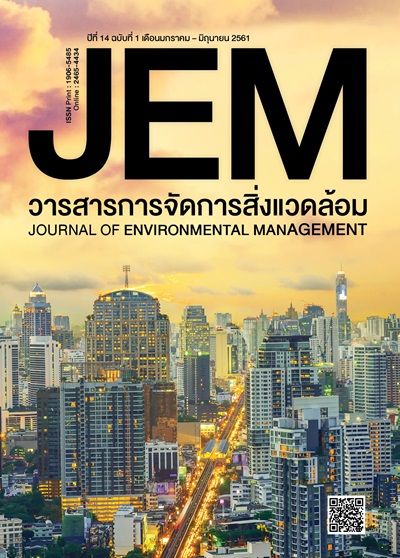การประเมินขีดความสามารถของกรุงเทพมหานครในการจัดการของเสียอันตรายจากชุมชน ASSESSING CAPACITY OF BANGKOK METROPOLITAN ADMINISTRATION IN MANAGING HOUSEHOLD HAZARDOUS WASTE
คำสำคัญ:
ของเสียอันตรายจากชุมชน, ตัวชี้วัด, กรุงเทพมหานครบทคัดย่อ
ของเสียอันตรายจากชุมชนมีปริมาณเพิ่มขึ้นอย่างต่อเนื่องตามการเจริญเติบโตทางเศรษฐกิจและความเป็นเมืองแต่งานวิจัยด้านนี้ยังมีอยู่น้อยมาก บทความนี้นำเสนอการพัฒนาตัวชี้วัดที่ประเมินขีดความสามารถขององค์กรปกครองส่วนท้องถิ่น (อปท.) ในการจัดการของเสียอันตรายจากชุมชนโดยมีกรุงเทพมหานครเป็นกรณีศึกษา ผลการประเมินตามตัวชี้วัด พบว่า กรุงเทพมหานครมีแผนและตัวชี้วัดในการเก็บรวบรวมของเสียอันตรายจากชุมชนที่ชัดเจน แต่มีจุดอ่อนบางประการ เช่น ขาดระบบรองรับการแยกทิ้งของเสียอันตรายที่ต้นทาง ขาดความต่อเนื่องในการรณรงค์ให้ประชาชนช่วยกันลดและแยกขยะ อุปสรรคสำคัญ คือ สำนักงานเขตไม่สามารถตั้งงบประมาณเฉพาะในการประชาสัมพันธ์รณรงค์ให้ประชาชนลดและแยกขยะและมีบุคลากรทางด้านนี้น้อย ผู้วิจัยเสนอให้กระทรวงมหาดไทยกำหนดให้การแยกขยะซึ่งรวมถึงการแยกทิ้งของเสียอันตรายเป็นนโยบายสำคัญของกระทรวงและมีตัวชี้วัดติดตามการดำเนินงานของ อปท.ที่ชัดเจนซึ่งจะช่วยให้ผู้บริหารของกรุงเทพมหานครและท้องถิ่นอื่นๆ ให้ความสำคัญกับการจัดการของเสียอันตรายมากขึ้น นอกจากนี้ หน่วยงานที่เกี่ยวข้องควรเร่งผลักดันกฎหมายที่กำหนดหน้าที่ของผู้ผลิตในการจัดระบบเรียกคืนซากผลิตภัณฑ์บางประเภทที่เป็นของเสียอันตรายเพื่อนำไปบำบัดและกำจัดอย่างปลอดภัย อันจะช่วยแบ่งเบาภาระของ อปท. ในการจัดการของเสียอันตรายจากชุมชนได้
เอกสารอ้างอิง
Bangkok Metropolitan Administration (2015). Bangkok Municipal Solid Waste Management Plan of 2015-2019 [in Thai: แผนบริหารจัดการขยะมูลฝอยของกรุงเทพมหานคร พ.ศ. 2558-2562]. Environmental Department, 46 pages. Retrieved May 6, 2016 from http://203.155.220.174/pdf/plan%20waste_1.pdf
Bangkok Metropolitan Administration (2017). Comparison of income and expenditure between fiscal year 2016 and 2017 [in Thai]. Finance Department. Retrieved January 10, 2017 from http://www.fdbma.net/modules.php?m=finance&op=detailnewsupdate&NUID=38
Department of Health (2014). Code of Practice Manual on Environmental Heath Accreditation for Local Administrative Organizations: Process 4.1 Solid Waste Management, Process 4.2 Infectious Waste Management, Process 4.3 Household Hazardous Waste Management [in Thai: คู่มือมาตรฐานการปฏิบัติงาน ระบบบริการอนามัยสิ่งแวดล้อม องค์กรปกครองส่วนท้องถิ่น กระบวนการที่ 4.1 การจัดการมูลฝอยทั่วไป กระบวนการที่ 4.2 การจัดการมูลฝอยติดเชื้อ กระบวนการที่ 4.3 การจัดการมูลฝอยที่เป็นพิษหรืออันตรายจากชุมชน]. Retrieved May 4, 2016 from http://foodsan.anamai.moph.go.th/ewt_dl_link.php?nid=465&filename=Handbook_EHA
Environmental Department of Bangkok Metropolitan Administration Facebook, https://www.facebook.com/bangkok.envir?fref=ts
Manomaivibool, P. and Hempatarasuwan, N. (2014). Comparing Capacity of Local Administrative Organizations on Solid Waste Management: A Case of Municipalities in Chiang Khong and Chiang Saen, Chiang Rai Province [in Thai: การเปรียบเทียบสมรรถนะในการจัดการขยะขององค์กรปกครองส่วนท้องถิ่น: กรณีศึกษา อปท.ในเขตอำเภอเชียงของและเชียงแสน จังหวัดเชียงราย]. Research Program on A Study for Chiang Khong-Chiang Saen Tourism Management Plan under support of Thai Health Promotion Foundation.
National Statistical Office (2016). Situation to Domestic Traveler, Bangkok 2009-2015. Retrieved March 16, 2016 from http://service.nso.go.th/nso/web/statseries/statseries23.html
Pollution Control Department (2007). Operation Manual for Local Administrative Organizations on Household Hazardous Waste Collection and Disposal [in Thai: คู่มือการปฏิบัติงานของเจ้าหน้าที่องค์กรปกครองส่วนท้องถิ่นในการเก็บรวบรวม ขนส่งและกำจัดของเสียอันตรายจากชุมชน]. Waste and Hazardous Substances Management Bureau. Bangkok: Usa Publising. http://infofile.pcd.go.th/haz/Guideline_communitywaste.pdf?CFID=19347036&CFTOKEN=76183892
Pollution Control Department (2013). Guideline on the Evaluation under Clean & Green City Project [in Thai: Guideline รายละเอียดการประเมินผล โครงการเมืองสวยใส ไร้มลพิษ (Clean & Green City)].
Pollution Control Department (2016a). Thailand State of Pollution Report 2015 [in Thai: รายงานสถานการณ์มลพิษของประเทศไทย ปี 2558]. 202 pages, Retrieved October 9, 2016, from http://www.pcd.go.th/public/Publications/print_report.cfm?task=pcdreport-58final
Pollution Control Department (2016b). Thailand Master Plan on Solid Waste Management for 2016-2021 [in Thai: แผนแม่บทการบริหารจัดการขยะมูลฝอยของประเทศ (พ.ศ. 2559 – 2564)]. 238 pages. Retrieved January 10, 2017 from http://infofile.pcd.go.th/waste/WasteMasterPlan.pdf?CFID=2389712&CFTOKEN=23614440
Pollution Control Department (2017a). Thailand State of Municipal Solid Waste Management 2016 [in Thai: รายงานสถานการณ์ขยะมูลฝอยชุมชนของประเทศไทย ปีพ.ศ. 2559]. Waste and Hazardous Substances Management Bureau. February. 540 pages. Retrieved May 1, 2017, from http://www.pcd.go.th/public/Publications/print_report.cfm?task=wsthaz_annual59
Pollution Control Department (2017b). Pollution Control Department Notification on Household Hazardous Waste Management Guideline for Local Administrative Organizations [in Thai: ประกาศกรมควบคุมมลพิษ เรื่อง แนวทางการบริหารจัดการของเสียอันตรายจากชุมชน สำหรับองค์กรปกครองส่วนท้องถิ่น]. Issued as of May 19, 2017. Retrieved June 5, 2017, from http://www.pcd.go.th/info_serv/file/24-05-60-1.pdf
Slack, R.J., Gronow, J.R., & Voulvoulis, N. (2009). The management of household hazardous waste in the United Kingdom. Journal of Environmental Management, 90, 36-42.
Sujitra Vassanadumrongdee (2017). Enabling Factors and Approaches towards Sustainable Household Hazardous Waste Management System in Bangkok and Nonthaburi Municipality: Final Report [in Thai: รายงานฉบับสมบูรณ์โครงการศึกษาปัจจัยและแนวทางการพัฒนาระบบการจัดการของเสียอันตรายจากชุมชนอย่างยั่งยืนในเขตกรุงเทพมหานครและเทศบาลนครนนทบุรี]. Office of Research Affair, Chulalongkorn University.
Suwanna Jungrungrueng (2014). Household Hazardous Waste Management of Bangkok Metropolitan Administration [in Thai: การจัดการขยะอันตรายจากชุมชนของกรุงเทพมหานคร]. PowerPoint presentation at the seminar on 11 September 2014 at Atrium Hotel, Bangkok.
Wilson, D.C. et al. (2015). ‘Wasteaware’ benchmark indicators for integrated sustainable waste management in cities. Waste Management, 35, 329-342.



